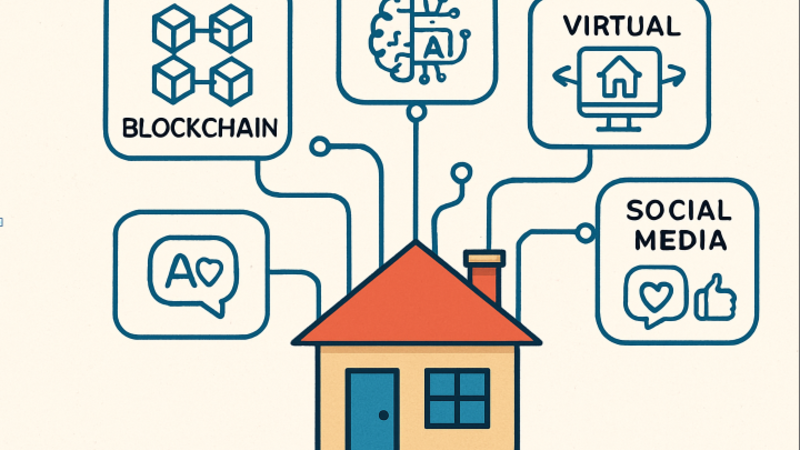Technology is transforming the How Technology Is Changing Real Estate Transactions estate industry, paving the way for quicker. More secure, and highly transparent property transactions. Innovative solutions such as blockchain, artificial intelligence, and interactive virtual platforms make it easier for buyers, sellers, and real estate professionals to navigate the complex landscape of property exchanges. Now, individuals can collaborate with West Palm Beach real estate experts Renny Realty and employ tech-driven strategies that streamline every phase of the real estate process. Advancements in digital marketing, data analytics, and property visualization tools create new possibilities, allowing for more personalized, efficient, and informed decisions. For sellers. These technologies open the door to larger markets and better valuation insights, while buyers benefit from unprecedented convenience and transparency. This ongoing digital evolution is optimizing transactions and raising the standards for security and trust in the industry.
Whether you are an investor, homeowner, or real estate agent, understanding the influence of these advancements is essential for leveraging their full potential. Today’s digital tools provide edge-cutting capabilities—transforming traditional real estate norms and helping industry leaders stay competitive in a swiftly evolving market. Moreover, as global real estate practices adapt to these innovations, their effects ripple across financial markets, urban development, and legal frameworks. The impact is clear: embracing technology is no longer optional—it’s foundational for anyone aiming to succeed in the modern property landscape.
Blockchain and Smart Contracts
Blockchain technology is rapidly gaining traction in real estate for its robust, transparent, and tamper-proof record-keeping. Smart contracts, digital agreements encoded onto a blockchain, automate critical real estate processes such as escrow handling, identity verification, and title transfer. This not only expedites transactions but also minimizes the need for intermediaries, which in turn can reduce costs and errors. Blockchain adoption is most apparent in platforms like RealT and Propy, where entire property assets can be tokenized, making cross-border property investment seamless and secure. These systems provide a transparent audit trail, invaluable in combating fraud and reinforcing stakeholder trust.
AI in Property Valuation
How Technology Is Changing Real Estate Transactions Artificial intelligence is revolutionizing how properties are valued and marketed. AI-powered platforms analyze complex datasets encompassing neighborhood trends, economic forecasts, local amenities, and buyer behavior patterns to produce highly accurate real-time property valuations. Leading industry players like Zillow and Redfin have developed deep learning-based Automated Valuation Models (AVMs) that provide dynamic pricing recommendations, equipping buyers and sellers with critical insights. These models also help to predict market fluctuations, allowing agents and clients to make strategic, data-driven decisions.
Key Takeaways
- Blockchain introduces automation and security to real estate with smart contracts.
- AI-driven tools offer advanced property valuation and forecasting.
- Virtual tours and online listings enhance property visibility and buyer convenience.
- Social media is essential for property marketing and real estate brand engagement.
Table of Contents
- Introduction
- Blockchain and Smart Contracts
- AI in Property Valuation
- Virtual Tours and Online Listings
- Social Media in Real Estate
- Challenges and Considerations
- Conclusion
Virtual Tours and Online Listings
Immersive technologies are redefining how people view homes. The rise of 3D and virtual How Technology Is Changing Real Estate Transactions tours means potential buyers can explore properties from anywhere in the world, at any hour. This has led to shorter sales cycles as prospects can more quickly rule out unsuitable homes and focus on viable options. Meanwhile. Sellers benefit from increased visibility, as high-quality virtual tours and interactive floor plans generate more engagement than static images alone. Online listings now often come equipped with detailed neighborhood analytics. Pricing histories, and even predictive analytics for future value, all of which allow buyers and sellers to make decisions with confidence.
Social Media in Real Estate
Social media has become an indispensable component of real estate marketing. Platforms such as Instagram, Facebook, and TikTok provide agents and brokerages with the tools to showcase listings. Share market knowledge, and build their brands organically. Visually compelling content—unique architecture, home staging, and video walkthroughs—can quickly go viral, exponentially increasing property exposure. Real estate professionals now use targeted advertising, influencer partnerships. And live Q&A sessions to attract, inform, and convert leads more effectively than ever.
Challenges and Considerations
While technological adoption in real estate has numerous advantages. The industry faces important hurdles. Legal, regulatory, and cybersecurity frameworks must evolve to keep pace with innovation. Blockchain-based transactions, for instance. Require new approaches to contract enforcement and government compliance. AI-powered valuation systems must prioritize clarity, prevent algorithmic bias, and safeguard user privacy. Additionally, rapid technological change can create barriers to access for less tech-savvy agents or buyers. Emphasizing the need for ongoing education and adaptability within the profession.
Conclusion
Technological innovation fundamentally reshapes the real estate transaction process. Offering greater efficiency, transparency, and accessibility for all stakeholders. Integrating blockchain, AI, virtual tours, and social media has created new standards and expectations throughout the industry. As these advances continue to unfold, industry professionals and consumers must remain agile. Seizing new opportunities and addressing emerging challenges to harness digital transformation’s power in real estate fully. More details to WORLD US MAGAZINE visit.


